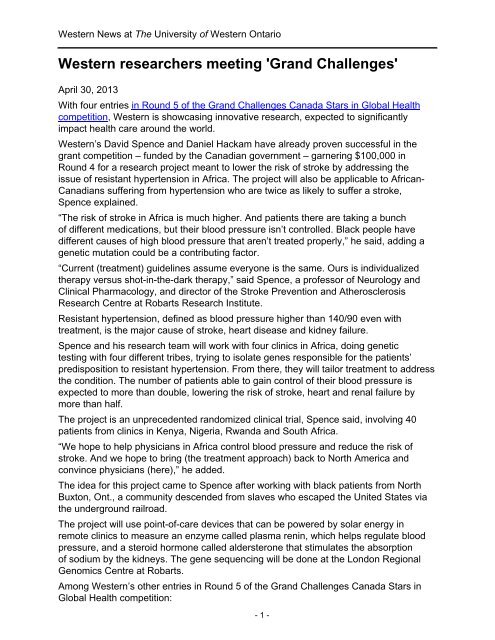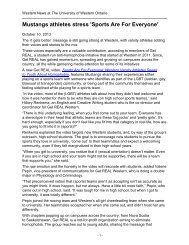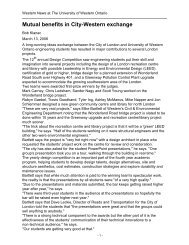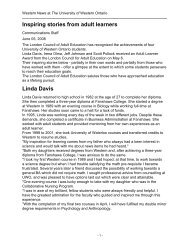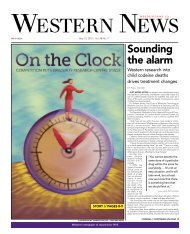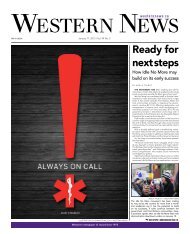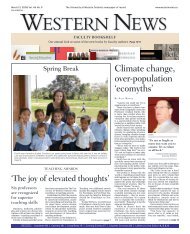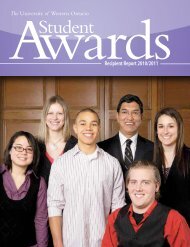Western researchers meeting 'Grand Challenges' - Western News ...
Western researchers meeting 'Grand Challenges' - Western News ...
Western researchers meeting 'Grand Challenges' - Western News ...
Create successful ePaper yourself
Turn your PDF publications into a flip-book with our unique Google optimized e-Paper software.
<strong>Western</strong> <strong>News</strong> at The University of <strong>Western</strong> Ontario<br />
<strong>Western</strong> <strong>researchers</strong> <strong>meeting</strong> <strong>'Grand</strong> <strong>Challenges'</strong><br />
April 30, 2013<br />
With four entries in Round 5 of the Grand Challenges Canada Stars in Global Health<br />
competition, <strong>Western</strong> is showcasing innovative research, expected to significantly<br />
impact health care around the world.<br />
<strong>Western</strong>’s David Spence and Daniel Hackam have already proven successful in the<br />
grant competition – funded by the Canadian government – garnering $100,000 in<br />
Round 4 for a research project meant to lower the risk of stroke by addressing the<br />
issue of resistant hypertension in Africa. The project will also be applicable to African-<br />
Canadians suffering from hypertension who are twice as likely to suffer a stroke,<br />
Spence explained.<br />
“The risk of stroke in Africa is much higher. And patients there are taking a bunch<br />
of different medications, but their blood pressure isn’t controlled. Black people have<br />
different causes of high blood pressure that aren’t treated properly,” he said, adding a<br />
genetic mutation could be a contributing factor.<br />
“Current (treatment) guidelines assume everyone is the same. Ours is individualized<br />
therapy versus shot-in-the-dark therapy,” said Spence, a professor of Neurology and<br />
Clinical Pharmacology, and director of the Stroke Prevention and Atherosclerosis<br />
Research Centre at Robarts Research Institute.<br />
Resistant hypertension, defined as blood pressure higher than 140/90 even with<br />
treatment, is the major cause of stroke, heart disease and kidney failure.<br />
Spence and his research team will work with four clinics in Africa, doing genetic<br />
testing with four different tribes, trying to isolate genes responsible for the patients’<br />
predisposition to resistant hypertension. From there, they will tailor treatment to address<br />
the condition. The number of patients able to gain control of their blood pressure is<br />
expected to more than double, lowering the risk of stroke, heart and renal failure by<br />
more than half.<br />
The project is an unprecedented randomized clinical trial, Spence said, involving 40<br />
patients from clinics in Kenya, Nigeria, Rwanda and South Africa.<br />
“We hope to help physicians in Africa control blood pressure and reduce the risk of<br />
stroke. And we hope to bring (the treatment approach) back to North America and<br />
convince physicians (here),” he added.<br />
The idea for this project came to Spence after working with black patients from North<br />
Buxton, Ont., a community descended from slaves who escaped the United States via<br />
the underground railroad.<br />
The project will use point-of-care devices that can be powered by solar energy in<br />
remote clinics to measure an enzyme called plasma renin, which helps regulate blood<br />
pressure, and a steroid hormone called aldersterone that stimulates the absorption<br />
of sodium by the kidneys. The gene sequencing will be done at the London Regional<br />
Genomics Centre at Robarts.<br />
Among <strong>Western</strong>’s other entries in Round 5 of the Grand Challenges Canada Stars in<br />
Global Health competition:<br />
- 1 -
� Computer Science professor Charles Ling and his research team have developed a<br />
mobile smartphone application meant to help patients with Type 2 diabetes.Called<br />
Cluco Guide, the application targets patients newly diagnosed with Type 2<br />
diabetes, aiming to teach them skills they need to manage their blood sugar<br />
and prevent complications from diabetes down the road.The app is user-friendly<br />
and patients are asked to input information into the app, including daily diet<br />
and exercise information, as well as their blood sugar levels, explained Jody<br />
Schuurman, a second-year MSc candidate at <strong>Western</strong> and part of Ling’s research<br />
team.What makes the app unlike any other is the fact that the information from<br />
the patient is transmitted wirelessly to Ling’s lab where data mining looks for<br />
correlations between the patient’s lifestyle and glucose levels, finding a pattern<br />
to help patients see what they should and shouldn’t do to reduce their blood<br />
sugar.“There have a handful of different lifestyle apps like this tested out in Canada<br />
but this one goes beyond the recommendations, taking it to the next step and<br />
collecting data and giving feedback as well,” Schuurman said.<br />
� Mandar Jog, a Neurology professor at <strong>Western</strong>, is also in the running with his<br />
Augmented Immersion Virtual Reality (AIVR) system, one he and his collaborators<br />
created as a safe and cost-effective tool to help rehabilitate patients with mobility<br />
dysfunctions and conditions such as Parkinson’s disease.AVIR, a virtual reality<br />
world, takes occupational therapy to the next level, providing fully interactive,<br />
customizable environments and rehabilitation scenarios that can mimic day-to-day<br />
tasks and activities for patients, allowing them to learn and become comfortable<br />
performing the task safely, anywhere.Learning how to do something like crossing<br />
a busy street, unsafe for some patients in the real world, is made safe and<br />
accessible by AVIR, Jog said.“In (occupational therapy), how are you going to show<br />
someone how to do groceries, make the bed, clean the kitchen? I don’t know what<br />
challenges (a patient) faces in their environment. I need to logically, at least, come<br />
close to simulating your environment. What this (AVIR) is going towards very fast is<br />
personalized medicine,” he explained.<br />
� Probiotic yogurt containing bacteria that can help break down toxins, pesticides and<br />
heavy metals, meant to ultimately decrease associated deaths in Africa, developed<br />
by <strong>Western</strong> Microbiology and Immunology professor Gregor Reid and his research<br />
team, is also a finalist in Round 5 of the competition.The bacteria developed by<br />
Reid and his team can be added to locally produced foods in African countries,<br />
helping to break down environmental pollutants, toxins and heavy metals that<br />
contaminate crops, killing and debilitating children in Africa.Consuming this bacteria<br />
helps to break down these toxins, removing them from the body along with waste,<br />
ultimately deceasing the morbidity rate associated with the consumption of toxins<br />
and pollutants, explained Nicholas Nduti, a PhD candidate at <strong>Western</strong> and part of<br />
Reid’s research team, now working with the Kenyan Ministry of Agriculture.<br />
Videos will be available online until May 31 and applicants will be notified of their<br />
application’s status this summer. Voting for an application is open to the public.<br />
The Department of Communications and Public Affairs<br />
Powered by Cascade Server<br />
- 2 -


